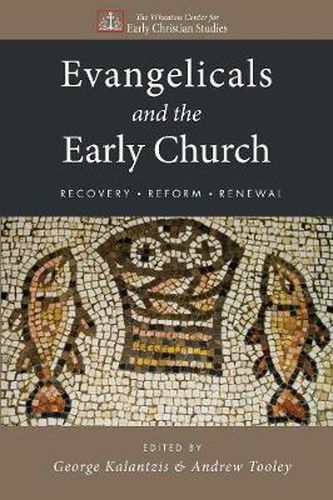Readings Newsletter
Become a Readings Member to make your shopping experience even easier.
Sign in or sign up for free!
You’re not far away from qualifying for FREE standard shipping within Australia
You’ve qualified for FREE standard shipping within Australia
The cart is loading…






This title is printed to order. This book may have been self-published. If so, we cannot guarantee the quality of the content. In the main most books will have gone through the editing process however some may not. We therefore suggest that you be aware of this before ordering this book. If in doubt check either the author or publisher’s details as we are unable to accept any returns unless they are faulty. Please contact us if you have any questions.
In this volume noted Evangelical historians and theologians examine the charge of the supposed ahistorical nature of Evangelicalism and provide a critical, historical examination of the relationship between the Protestant evangelical heritage and the early church. In doing so, the contributors show the long and deeply historical rootedness of the Protestant Reformation and its Evangelical descendants, as well as underscoring some inherent difficulties such as the Mercersburg and Oxford movements. In the second part of the volume, the discussion moves forward, as evangelicals rediscover the early church-its writings, liturgy, catechesis, and worship-following the temporary amnesia of the earlier part of the twentieth century. Most essays are accompanied by a substantial response prompting discussion or offering challenges and alternative readings of the issue at hand, thus allowing the reader to enter a conversation already in progress and engage the topic more fully. This bidirectional look-understanding the historical background on the one hand and looking forward to the future with concrete suggestions on the other-forms a more full-orbed argument for readers who want to understand the rich and deep relationship between Evangelicalism and the early church.
$9.00 standard shipping within Australia
FREE standard shipping within Australia for orders over $100.00
Express & International shipping calculated at checkout
Stock availability can be subject to change without notice. We recommend calling the shop or contacting our online team to check availability of low stock items. Please see our Shopping Online page for more details.
This title is printed to order. This book may have been self-published. If so, we cannot guarantee the quality of the content. In the main most books will have gone through the editing process however some may not. We therefore suggest that you be aware of this before ordering this book. If in doubt check either the author or publisher’s details as we are unable to accept any returns unless they are faulty. Please contact us if you have any questions.
In this volume noted Evangelical historians and theologians examine the charge of the supposed ahistorical nature of Evangelicalism and provide a critical, historical examination of the relationship between the Protestant evangelical heritage and the early church. In doing so, the contributors show the long and deeply historical rootedness of the Protestant Reformation and its Evangelical descendants, as well as underscoring some inherent difficulties such as the Mercersburg and Oxford movements. In the second part of the volume, the discussion moves forward, as evangelicals rediscover the early church-its writings, liturgy, catechesis, and worship-following the temporary amnesia of the earlier part of the twentieth century. Most essays are accompanied by a substantial response prompting discussion or offering challenges and alternative readings of the issue at hand, thus allowing the reader to enter a conversation already in progress and engage the topic more fully. This bidirectional look-understanding the historical background on the one hand and looking forward to the future with concrete suggestions on the other-forms a more full-orbed argument for readers who want to understand the rich and deep relationship between Evangelicalism and the early church.